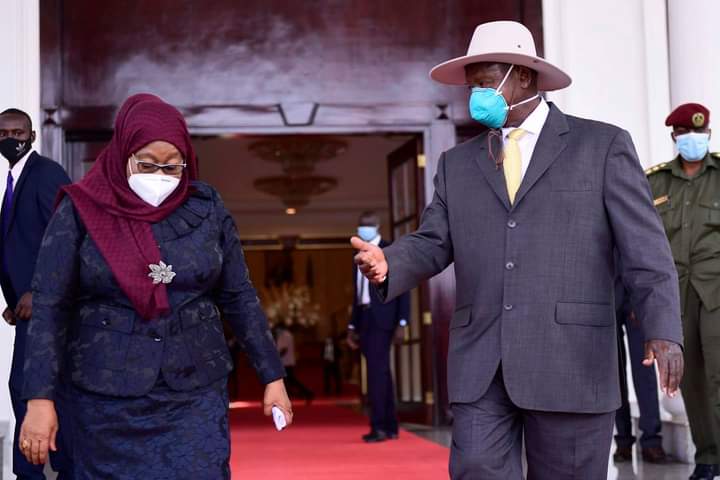Prime
CSOs question secrecy about new oil deals

President Museveni welcomes his Tanzanian counterpart Samia Suluhu Hassan at State House Entebbe on April 11, 2021 prior to the signing of the Tripartite Oil Pipeline agreement. PHOTO/PPU
What you need to know:
- In a joint communique signed by 44 civil societies in Uganda and DR Congo, the organisations say governments of Uganda and Tanzania together with the oil companies have flouted a number of transparency protocols.
Uganda’s oil fields are located along the Uganda-DRC borders and tensions have in the past erupted over mineral rights.
A number of Civil Society Organisations (CSOs) in Uganda and DR Congo have rejected the recently signed oil agreements over lack of transparency, environmental concern and failure to consult the population on key issues in the oil business.
In a joint communique signed by 44 civil societies in Uganda and DR Congo, the organisations say governments of Uganda and Tanzania together with the oil companies have flouted a number of transparency protocols.
They also argued that while DRC is not directly involved in the oil agreement process, citizens could be affected, adding that no safety guarantees have been put in place.
Uganda’s oil fields are located along the Uganda-DRC borders and tensions have in the past erupted over mineral rights.
The CSOs say it was wrong for the two governments to sign such agreements before addressing key issues.
Both Uganda and Tanzania are signatories to the Extractive Industries Transparency Initiative (EITI), which demands that all oil-related text agreements, licences and contracts must be made public to promote transparency and accountability. Uganda joined EITI in 2020, while Tanzania has been a member since 2009.
“It is unfortunate that the governments of Uganda, Tanzania and the oil companies have continued to operate in secrecy yet secrecy leads to the oil curse characterised by corruption, poverty, environmental destruction, conflicts and other ills in African oil-producing countries,” part of the joint communique reads.
The organisations say government is launching oil projects without consideration of the environmental and social impacts in the affected communities.
“The lack of Environmental and Social Management Plans is a major gap as district leaders, local communities, cultural institutions, religious leaders, CSOs and other stakeholders lack information on the major potential environmental, social and climate change impacts of the Lake Albert project,” the CSOs said.
The communique also faults government and oil companies for failing to make public any copy of environmental and social impact assessment report on the feeder oil pipeline.
They said the feeder pipeline, which transports crude oil from the Central Processing Facility in Buliisa District to a delivery point at Kabaale in Hoima District, would be subject to a separate ESIA from the Tilenga project.
The CSOs also say climate change issues have been ignored. They say while government and oil companies have pledged to plant trees for carbon capture, the process of acquiring land has been shrouded in conflicts.
“Already, communities whose land is being acquired for the EACOP project are complaining over failure to pay them fair, adequate and prompt compensation in compliance with the law,” the group says.
They also accused the president of arm-twisting the Parliament to comply with secret agreements they signed with the oil companies.
“...Share the climate change, environmental and biodiversity mitigation management plans for the Tilenga, Kingfisher and EACOP oil projects with the public for review to determine their adequacy,” they said.
We were unable to get response from the Energy ministry officials. Minister Mary Gorreti Kitutu, who is also a former minister of environment, was not available to explain how the concerns raised by CSOs will be handled.
However, Mr Patrick Pouyanné, the chairperson and Chief Executive Officer of Total, in a press release said the company is aware that they are operating in a sensitive ecosystem, adding that they would protect the biodiversity.
He also pledged to protect the rights of the local communities in the areas affected.



